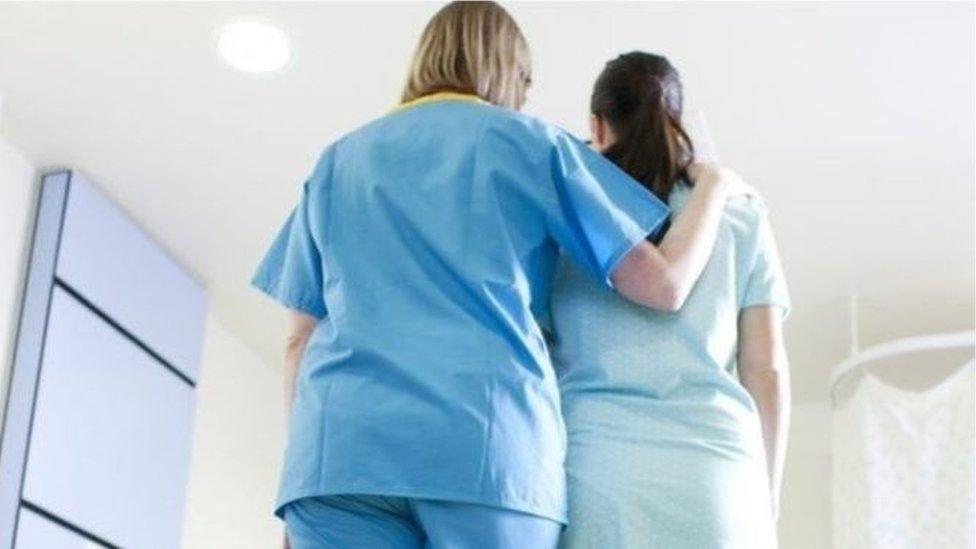NI health trusts 'stopped from carrying out early abortions'
- Published

Medical professionals who can perform an abortion include a doctor, a registered nurse or a registered midwife
Some NI health trusts have been stopped from carrying out early abortion services, BBC News NI understands.
Last month, NI's abortion laws changed to permit terminations up to 12 weeks.
The Belfast and Northern Trusts agreed their own temporary plans until full services were in place, but were told not to move ahead, the BBC understands.
The health department has not yet commissioned the services; it said it told trusts it was exploring options and they should await more information.
"The department fully understands the concerns of individual clinicians who wish to provide this service for women," said a statement from the Department of Health.
"The department is continuing to address this matter."
Travel difficulties
BBC News NI has spoken to several sources who said the trusts had decided on the services last week.
The Belfast Trust also covers the South Eastern Trust for sexual reproductive health services.
The department's original plan was to allow women from Northern Ireland to continue travelling to England for abortion access, until it could get a local system in place later this year.
However, the Covid-19 crisis means restrictions on travel and difficulties for women getting to and from Great Britain.

It is understood family planning practitioners within the Belfast and Northern Trusts agreed a way of providing local services so women would not need to leave Northern Ireland.
It would see doctors, nurses and midwives at sexual and reproductive clinics within the trusts carrying out consultations for women, and issuing them with abortion medication.
The first pill would be taken in a clinic and the second at home.
BBC News NI has been told that the trusts were instructed by the Department of Health not to proceed with their plans last week, pending the issue being discussed by the Northern Ireland Executive.
An advisory paper was brought by Health Minister Robin Swann to the executive's meeting on Monday, detailing the current situation and future options.
However, abortion is a sensitive issue that divides the political parties, and it is understood no decision was taken at the meeting about how to proceed.
On Tuesday, DUP leader Arlene Foster said NI's Attorney General John Larkin had also raised issues about the implementation of the framework that would need to be addressed by the executive.
How did we get here?
Last July, MPs at Westminster voted to decriminalise abortion in Northern Ireland and create new laws.
Prior to that vote, abortion was only allowed in very limited circumstances.
It fell to the Northern Ireland Office to come up with a framework to oversee the provision for abortion services.
Last month, the regulations were made public for the first time, external and set out when and where abortions could take place, as well as who could carry them out.
Stormont's Department of Health has the responsibility to implement the new laws, but has not given a time-frame for when it expects the services to be in place.
What is in the new framework?
Terminations will be legal up to 12 weeks, without conditions.
A limit of 24 weeks will apply in situations where continuing the pregnancy would involve risk of injury to the woman's physical or mental health.
No time limit will apply in cases of fatal fetal abnormality, where there is a substantial risk that the fetus would die or, if born, would suffer a severe mental or physical impairment.
There will also be no time limit for an abortion if there is a risk to the life of the mother, greater than if the pregnancy is not terminated - or, the government says, "where necessary to prevent grave permanent injury to the physical or mental health of the pregnant woman or girl, including in cases of immediate necessity".
Medical professionals who can perform an abortion include a doctor, a registered nurse or a registered midwife.
Conscientious objection will apply - meaning those medical professionals who do not want to participate in carrying out a termination will not be obliged to do so.
The framework makes provision for abortions to be carried out in GP premises, clinics provided by a health and social care trust and HSC hospitals.
- Published31 March 2020

- Published31 March 2020

- Published25 March 2020

- Published22 October 2019
